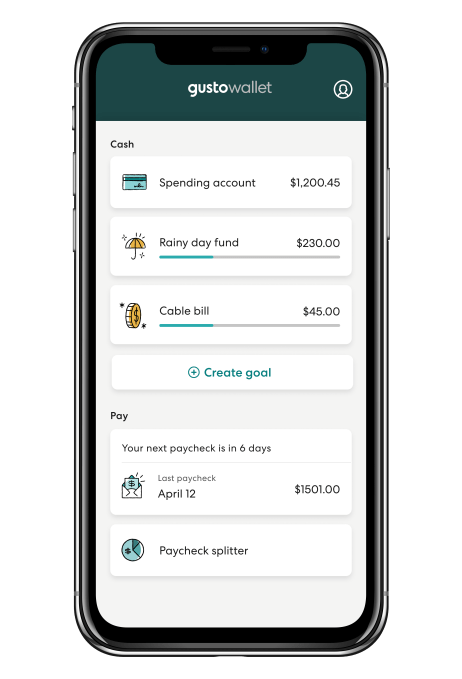When we caught up with Gusto last year, the small business payroll startup had just raised $200 million and was launching a new office in New York City. Over the past few years though, Gusto has also been accruing new features outside of its original payroll product, features that redefine the borders between payroll and financial wellness, and in the process, are blurring the lines of the classic fintech market map.
Today, the company announced a slew of new offerings that it hopes will give employees better financial and health options through their employers.
The most interesting one here is a tool the company is calling Gusto Wallet. It’s an app and collection of products for employees paid through Gusto that basically acts as a mini bank and financial health monitor. It offers an interest-bearing cash account (called, appropriately enough, Cash Accounts) which can also divert a small slice of each paycheck into a user’s savings, similar to products like Acorns and Digit. Cash stored in the account earns 0.34% interest today, and you can also get a Gusto debit card to spend it.

Gusto’s app gives you access to financial services and wellness tools. Photo via Gusto
For employees, what’s interesting here is that these services are offered essentially for free: Gusto makes money on its payroll services from employers as a software subscription fee, and so it offers financial services like these as an inducement to keep employers and employees engaged. Gusto hopes that this can keep debt low for employees, and also offer them more financial stability, particularly as businesses open and close in the wake of COVID-19.
In addition, Gusto Wallet also offers “Cashout,” which can accelerate a payday ahead of time based on the pay history of an employee. Rather than securing a high-cost payday loan, the product is designed to help users smooth out a bit of their income if they need their paycheck a bit ahead of their actual direct deposit. It’s also free of fees.
Gusto CEO Joshua Reeves said that “One of the biggest problems is people are oftentimes living paycheck-to-paycheck — they’re either not saving money, or they’re getting stuck in debt accessing things like overdraft fees, or credit card debt, or payday loans.” The hope with Gusto Wallet is that its easy availability and low costs not only attract users, but leave them in much better financial shape than before.
What’s interesting to me is placing these new features in the wider scope of the fintech landscape. It seems that every week, there is another startup launching a consumer credit card, or a new debt product, or another savings app designed to help consumers with their finances. And then every week, we hear about the credit card startup launching a new savings account, or the savings app launching an insurance product.
The math is simple: it’s very, very hard to acquire a customer in financial services, and it’s so competitive that the cost per acquired customer is extremely high (think hundreds of dollars or more per customer). For most of these startups, once you have a customer using one financial product, much like traditional banks, they want you to use all of their other products as well to maximize customer value and amortize those high CAC costs.
Gusto is an interesting play here precisely since it starts at the payroll layer. Banks and other savings apps often try to get you to send your paycheck to their service, since if your money resides there, you are much more likely to use that service’s features. Gusto intercepts that transaction and owns it itself. Plus, because it ultimately is selling subscriptions to payroll and not financial services, it can offer many of these features outright for free.
Reeves said that “This is a future that just seems inevitable, like all this information right now is sitting in silos. How do we give the employee more of that ownership and access through one location?” By combining payroll, 401K planning, savings accounts, debit cards, and more in one place, Gusto is hoping to become the key financial health tool for its employee end users.
That’s the financial side. In addition, Gusto announced today that it is now helping small businesses setup health reimbursement accounts. Under a provision passed by Congress a few years ago, small businesses have a unique mechanism (called QSHERA) to offer health reimbursement to their employees. That program is riven with technicalities and administrivia though. Gusto believes its new offering will help more small businesses create these kinds of programs.
Given Gusto’s small business focus, this year has seen huge changes thanks to the global pandemic. “It’s been an inspiring, challenging, motivating, [and] galvanizing time for the company,” Reeves said. “Normally, I would say [we have] three home bases: New York, SF, [and] Denver. Now we have 1,400 home bases.” That hasn’t stopped the company’s mission, and if anything, has brought many of its employees closer to the small businesses they ultimately serve.

Gusto team, with CEO Joshua Reeves on the left of the second row. Photo via Gusto
Comments
Post a Comment